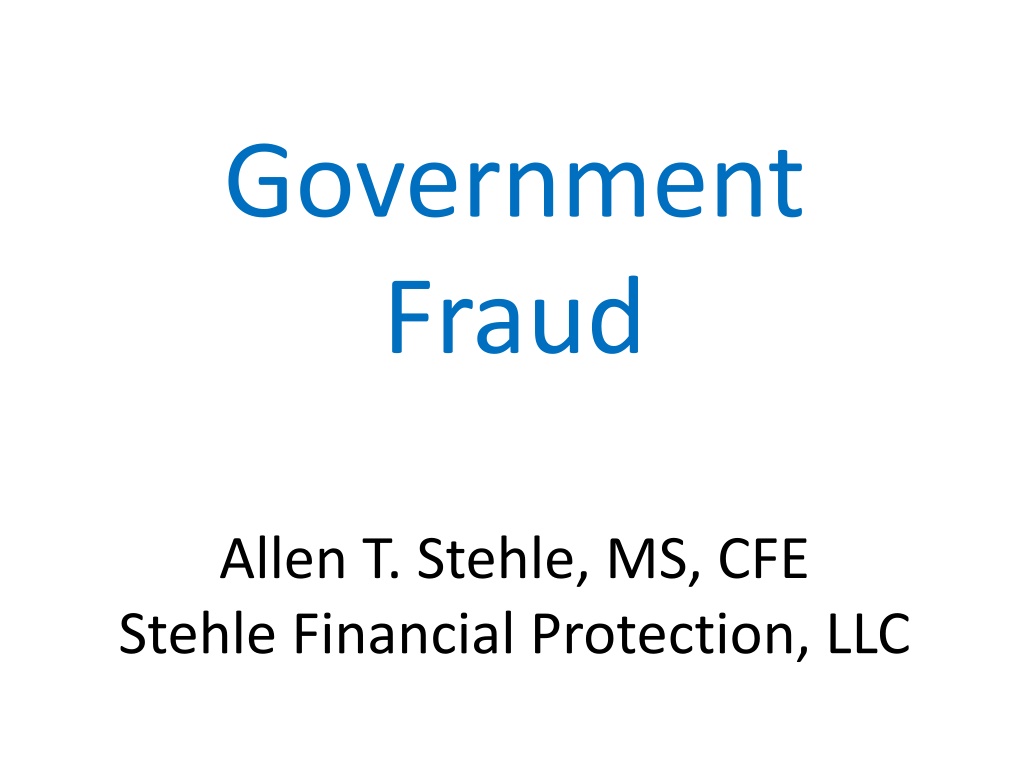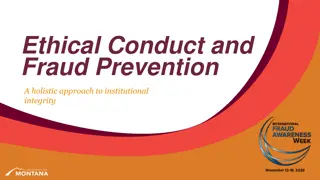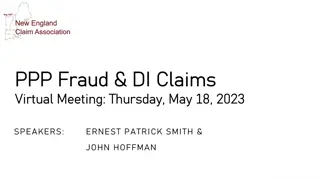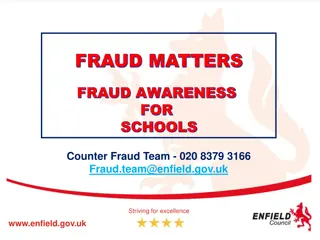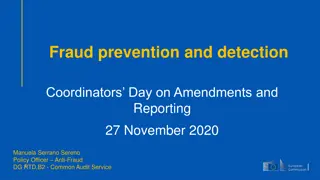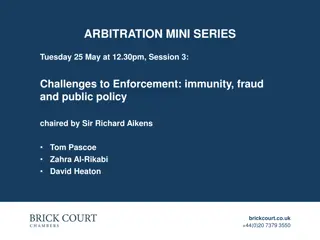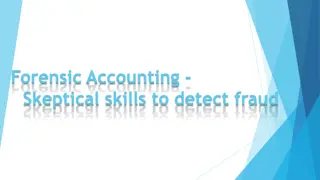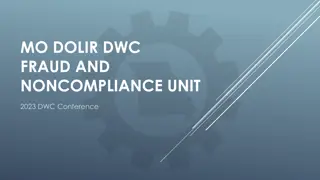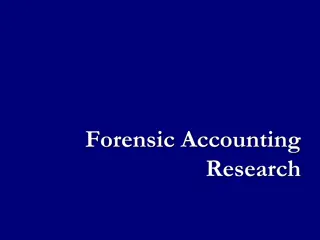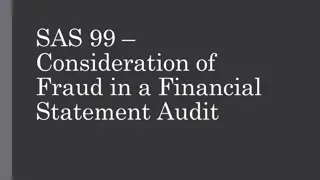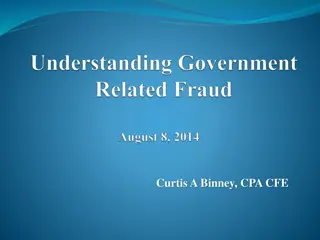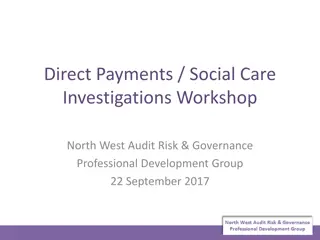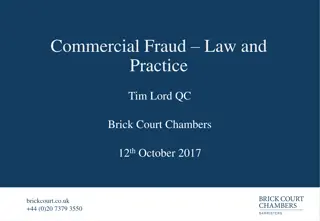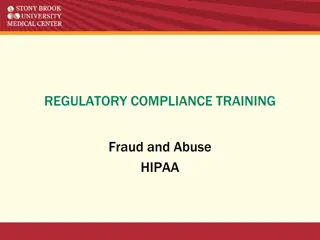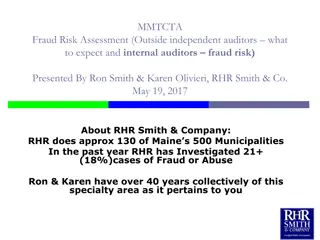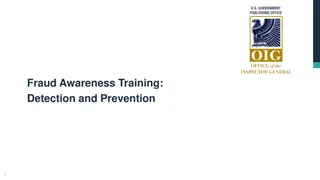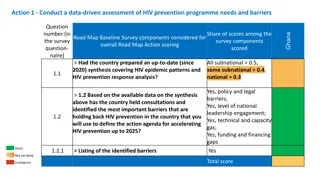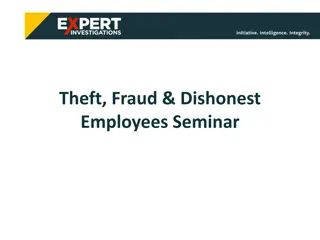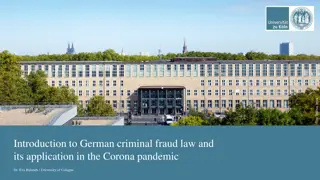Understanding Government Fraud: Impacts and Prevention
Government fraud is a serious issue that impacts public trust and financial stability. This type of fraud involves intentional acts to deceive the government and can occur internally or externally. The public perception of government organizations is affected by fraud, and entities such as the U.S. federal government are prime targets. Fraud can lead to reputational harm, loss of public trust, increased operating costs, and potential job losses. The City of Dixon fraud case serves as a stark example of the consequences of fraud in municipal settings.
Download Presentation

Please find below an Image/Link to download the presentation.
The content on the website is provided AS IS for your information and personal use only. It may not be sold, licensed, or shared on other websites without obtaining consent from the author. Download presentation by click this link. If you encounter any issues during the download, it is possible that the publisher has removed the file from their server.
E N D
Presentation Transcript
Government Fraud Allen T. Stehle, MS, CFE Stehle Financial Protection, LLC
What is Government Fraud? It is an intentional act designed to deprive the government of funds by deception or other unfair means. All forms of cheating involving money or property are fraud. Fraudulent acts are carried out by individuals inside (employees and elected officials) and outside (contractors, customers and beneficiaries) of the governmental body.
Public Perception of Government Organizations The public is highly opinionated about government organizations. Frauds against government organizations are frauds against the public. The government sector is rife with frauds. Government employees and officers should not be highly reimbursed. Public sector salaries and benefits are much higher than the private sector.
Government Entities: Prime Targets for Fraud Large dollar amounts of government spending Major employer U.S. federal government is the nation s largest employer. Approximately 15.6% of workers in the U.S. are government workers (2010 U.S. Census). U.S. Dept. of Defense alone is the world s largest employer (BBC, 2012). Lack of resources allocated to combat fraud Inadequate data sharing Most entitlement programs are pay and chase when overpayments or illicit payments are made.
Harm from Fraud Reputational harm and loss of public trust the public tends to view government organizations under heightened security when managing taxpayer dollars Harmful to the beneficiaries of government programs Increases operating costs for the agency which can increase taxes on the public Potential job loss due to revenue shortfalls
City of Dixon Fraud This was the largest municipal fraud in US history. Comptroller was sentenced to 19 years and 7 months for stealing $53.7 million from the City of Dixon, Illinois. Proceeds from the liquidation of perpetrator s illicit assets totaled $12.38 million as of February, 2013. Fraud was discovered in the fall of 2011 by another employee who found anomalies while the Comptroller was on vacation.
City of Dixon Fraud, continued Opened RSCDA Reserve Fund bank account for which the Comptroller had sole access. Transferred monies from other City accounts to the RSCDA Reserve Fund bank account. Used funds from the RSCDA Reserve Fund account for personal use.
City of Dixon Fraud, continued Concealed the RSCDA Reserve Fund bank account by picking up the bank statements included in the City s mail. When the Comptroller was away, other staff would pick up the mail and separate out her mail which included the RSCDA bank statements. Comptroller created 159 fictitious invoices to show the City s auditors that funds being transferred to the account were being used legitimately.
City of Dixon Fraud, continued The Comptroller took an average of more than $2.5 million per year over 20 years. In one year, she stole $5.8 million. The Comptroller participated in budget meetings with City Council members and stated that the lack of City funds was due to a down economy and because the State of Illinois was behind in its tax payments to the City.
City of Dixon Fraud, continued The Comptroller s annual salary was $80,000 as of 2011. The Comptroller used the stolen funds to allow for a lavish life style and to finance her quarter horse farming business.
Classifications of Fraudsters There are three classifications of fraudsters: 1. Calculating Criminals 2. Situation Dependent Criminals 3. Power Brokers
Calculating Criminals Are predatory Tend to be repeat offenders Possess a higher-than-average intelligence Usually begin careers later in life than other criminals, thereby acquiring knowledge which allows them to circumvent internal controls Are risk-takers Lack feeling and empathy
Calculating Criminals, continued Psychology studies of Wall Street s insider trading scandals have found that calculating criminals: Lacked inner direction Lacked self-confidence Lacked self-esteem Motivated by a desire to fit in and be accepted Define success by other standards
Calculating Criminals, continued The best self-defense tactic to try to keep the calculating criminal type out of your organization is by performing a thorough background check including a criminal background check.
Situation Dependent Criminals Situation dependent criminals, the second classification of fraudsters, are much more common than the calculating criminal classification. Situation dependent criminals are those individuals who are desperate to save themselves, their families, or their companies from a catastrophe.
Situation Dependent Criminals, continued The vast majority of these types of criminals are not predators at all. They commit crimes without the intent to harm others. They are the most common type of offenders and account for the majority of white-collar crime.
Power Brokers Power brokers, the third classification of fraudsters, possess characteristics of both calculating criminals and situation dependent criminals. However, they believe that they have the power to succeed at any cost. Examples include the following: Enron Tyco WorldCom
Typical White-Collar Criminal Older (30+ years) 55% male, 45% female An appearance of a stable family situation Above-average (postgraduate) education Less likely to have a criminal record Good psychological health Employed in a position of trust Have detailed knowledge of accounting systems and their weaknesses Prior accounting experience is common Source: ACFE/Association of Certified Fraud Examiners
Why People Commit Fraud: Situation-Dependent Cressey s Fraud Triangle: Need or Pressure Opportunity Rationalization
Need or Pressure / Cresseys Fraud Triangle Behavioral Red Flags (Source: ACFE) Living beyond means 45.8% Financial difficulties 30.0% Unusually close vendor/customer relationships 20.1% Wheeler-dealer attitude 15.3% Control issues, non-sharing of duties 15.3% Divorce/family problems 13.4% Irritability, suspiciousness or defensiveness 12.3% Addiction problems 10.0%
Need or Pressure, continued Complaints of inadequate compensation 9.0% No behavioral red flags 8.8% Refusal to take vacations 7.8% Experienced excessive pressure within organization 7.0% Past employment-related problems 6.8% Social isolation 5.9% Past legal problems 5.8% Other 5.5% Excessive family/peer pressure for success 5.1% Complaints of a personal lack of authority 4.4% Instability in life circumstances 4.3%
Perceived Opportunity / Cresseys Fraud Triangle Poor internal controls Poor separation of duties Poor training Poor supervision Lack of prosecution of perpetrators Ineffective or absent anti-fraud programs, policies and procedures Weak ethical culture (e.g., poor tone at the top) Source: ACFE/Association of Certified Fraud Examiners
Perceived Opportunity, continued If you forget everything else that I say today, remember that this is the most important point: If you deny perceived opportunity through the implementation of sound internal controls, supervision and ethics, you go a long way in denying the potential of fraud from taking place. Proactive enforcement is much less costly than reactive enforcement stop the crime before it happens.
Rationalization We could spend a week exploring the psychology of this topic alone. However, the most important points of rationalization are as follows: Rationalization is important early on but diminishes with multiple frauds and is likely not an issue as fraud progresses. The fraud becomes an acceptable practice to the perpetrator.
Capability to Exploit an Opportunity Opportunity tells you that there is a lot of cash behind a locked door capability or knowledge gets you to the key or a way to pick the lock. The person s position or function may provide the ability to create or exploit an opportunity to commit fraud. The person has the capability to exploit control weaknesses. The person could have designed the controls. The person is persuasive and can coerce others to commit or conceal fraud. Source: Wolfe and Hermanson
Work Environment Factors that Result in Fraud Placing too much trust in key employees Lack of proper procedures for authorization of transactions No separation of authorization of transactions from the custody of related assets Lack of independent checks on performance Inadequate attention to details No separation of custody of assets from the accounting of same assets Source: Albrecht, Howe and Romney
Work Environment Factors that Result in Fraud, continued No separation of duties among accounting functions Lack of clear lines of authority and responsibility Department not frequently reviewed by internal auditors All of these listed factors can increase the employee s opportunities to commit fraud without being caught.
Occupational Fraud by Government Employees Asset Misappropriation: Larceny Taking of cash after it has been recorded in the agency s books Theft of cash or checks from the register and theft of office supplies, postage, landfill tickets and the like
Occupational Fraud by Government Employees, continued Asset Misappropriation Skimming Taking cash before it has been recorded on the agency s books Sales Skimming collecting cash payments from the customer without recording or by understating the sale of a good or service Receivables Skimming Stealing cash payments and not recording the payment on the books, thereby leaving an outstanding balance on the customer account (lapping is often used to cover the unrecorded payment)
Occupational Fraud by Government Employees, continued Other Asset Misappropriation Fraudulent Disbursements using agency funds to purchase items for employee personal use Billing schemes: False invoicing schemes False invoicing via shell companies False invoicing via non-accomplice vendors
Occupational Fraud by Government Employees, continued Other Asset Misappropriation, continued Payroll schemes: Ghost employee schemes Falsified wage and hour documents schemes Falsifying pay rate Falsely reporting paid time off Committing overtime abuses
Occupational Fraud by Government Employees, continued Other Asset Misappropriation, continued Employee expense reimbursement schemes Mischaracterized expenses Overstated expenses Fictitious expenses Multiple reimbursements Theft of noncash assets Inventory theft and shrinkage
Internal Controls Five easy ways to implement internal controls: 1. Independent review of bank statements 2. Independent review of canceled/processed checks 3. Independent review of cash receipts 4. Anonymous reporting system (fraud hotline) 5. Surprise examinations
Internal Controls, continued Segregate duties, if possible. If segregating duties is not possible due to small town budgets for employees, utilize independent checks. Increase perception of detection. Implement an anonymous reporting system and, by all means, follow through on any information.
Internal Controls, continued Do NOT overlook suspicious or unexplainable activity. Managers must have a good understanding of the work functions, ask questions and actively manage the staff.
Internal Controls, continued Deterrence is the best form of preventing a fraud in your agency, similar to proactive policing versus reactive policing. People rarely commit fraud if they think they will get caught. The perception of detection is the most effective deterrent to fraud.
Internal Controls, continued Example: Alabama Sheriff case where is the dummy? I strongly feel that management needs robust internal controls to help their employees resist pressures to commit fraud. If you can deny the opportunity, you can deny a potential fraud from happening at your agency.
Internal Controls, continued Check out the Association of Certified Fraud Examiner s website at ACFE.com for the Fraud Prevention Check-Up . This is a good resource to utilize at your agency and assess the fraud prevention health of your internal controls.
How to Build an Effective Ethics Program Ethical behavior is doing the right thing when no one else is watching even when doing the wrong thing is legal. (Aldo Leopold) Ethical dilemma a situation concerning right and wrong where values are in conflict Business ethics the application of values such as integrity, fairness, respect and openness, to organizational behavior
Organizational Pressures to Act Unethically 1. Following supervisor s orders 2. Meeting impracticable business or financial objectives 3. Helping the organization survive 4. Meeting stringent deadlines 5. Wanting to be a team player Source: Human Resource and the Ethics & Compliance Initiative (ECI)
Extent of Unethical Behavior 75% of employees have stolen at least once from their employer 67% of CFO s have been pressured to misrepresent results 33% of employees have called in sick and are not actually ill 25% of middle managers have written a fraudulent internal report Source: Business Ethics by Dennis Collins
Detection of Fraud Schemes, 2016 Tip 39.1% Internal Audit 16.5% Management review 13.4% By accident 5.6% Account reconciliation 5.5% Other 5.5% Document examination 3.8% External audit 3.8% Notified by LE 2.4% Surveillance/monitoring 1.9% IT controls 1.3% Confession 1.3% Source: ACFE/Association of Certified Fraud Examiners
Sources of Tips Employee 51.5% Customer 17.8% Anonymous 14.0% Other 12.6% Vendor 9.9% Shareholder/Owner 2.7% Competitor 1.6% Source: ACFE/Association of Certified Fraud Examiners
Impact of Hotlines While tips were the most common detection method regardless of whether a hotline was in place, schemes were detected by tips in 47.3% of cases at organizations that had hotlines, but in only 28.2% of cases at organizations without them. More than 40% of all tips were received from non-employees such as customers and vendors. Source: ACFE/Association of Certified Fraud Examiners
Create a Whistleblower Policy: ACFE Guidelines A whistleblower policy must be well-communicated and include: 1. Examples of allegations that should be reported 2. The various reporting mechanisms available, including phone or email 3. Whether the reporting mechanism is anonymous and confidential 4. Anti-retaliation provisions 5. Incentives/rewards for whistleblowers
Create a Whistleblower Policy: ACFE Guidelines, continued Formal reporting mechanisms which are used by whistleblowers include: 1. Telephone hotline 39.5% 2. Email 34.1% 3. Web-based Online form 23.5% 4. Mailed letter/forms 16.7% 5. Other 9.8% 6. Fax 1.5%
Writing an Ethics Policy: ACFE Guidelines 1. Keep it short. 2. Use simple vocabulary. 3. Definitions and acronyms lead with a detailed explanation. 4. Be concise. 5. Provide examples. 6. Consider the audience. 7. Solicit feedback. 8. Distribute the policy and have employees read and sign the policy.
Ten Tips for Ethics Training: ACFE Guidelines 1. Do not drown employees in details. 2. Focus training disproportionately on management. 3. Make training interactive. 4. Keep training short. 5. Use a variety of media types. 6. Use simple do s and don ts . 7. Employ engaging gimmicks such as quizzes, games or skits. 8. Personalize the ethics code to the company/agency. 9. Have managers conduct the training. 10. Tell stories of employee misconduct and how they were handled.
Why Ethics Policies Fail 1. Putting the code on the shelf 2. Ignoring the company s culture 3. Misguided or poor recruitment and hiring strategies 4. Exclusive focus on financial performance metrics 5. Failing to create a credible hotline 6. Fear of retaliation for being a whistleblower 7. Weak internal controls 8. Poor tone at the top Source: ACFE/Association of Certified Fraud Examiners
Conclusion, Group Scenario and Q & A Conclusion and group scenario Questions & answers
